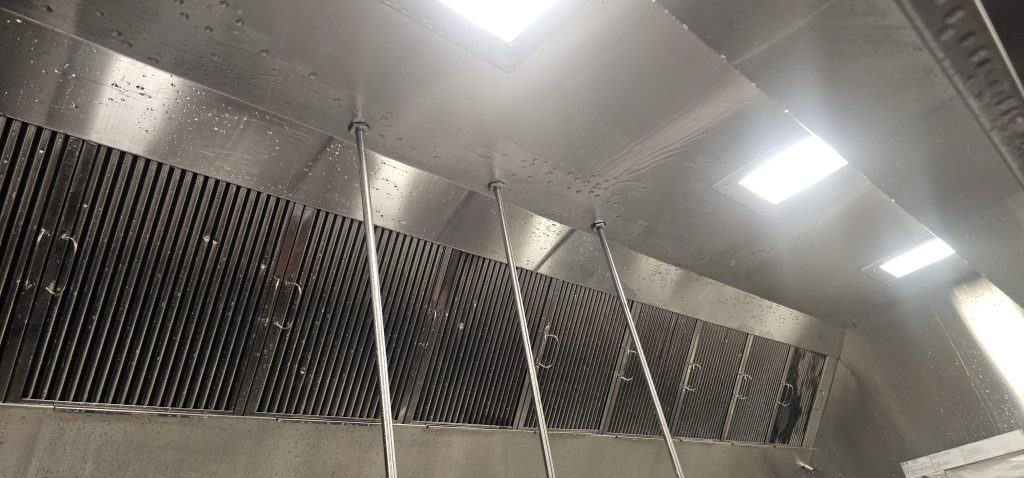Atlanta's Trusted Restaurant Hood Cleaning Professionals

Premier Grease Saves You Time & Money
We Require No Contracts and Trust That Our Service Will Keep You Coming Back.
Welcome to Premier Grease, where we provide top-tier grease management solutions to keep your commercial kitchen running smoothly. Our expert services in hood cleaning, used cooking oil recycling, and grease trap cleaning are designed to ensure your kitchen remains safe, efficient, and compliant with all regulations. Whether you’re in need of routine maintenance or urgent service, our experienced team is dedicated to delivering reliable solutions to meet your specific needs.
- 24+ Years Experience
- Satisfaction Guaranteed
- Licensed, Bonded, Insured
- Free Estimates & Consultations
- Reliable Services You Can Count On
Send Us A Message
YES! We Reply To These Messages ASAP!
Restaurant Hood Cleaning: Your First Line of Fire Defense
Our Comprehensive Restaurant Hood Cleaning Services:
Deep Hood Canopy and Interior Cleaning
Professional Filter Maintenance and Replacement
Scheduled Maintenance Plans Tailored to Your Operation
Emergency Hood Cleaning Response
Compliance Documentation and Certification
Hood System Component Inspection and Maintenance
The Critical Importance of Professional Restaurant Hood Cleaning
Fire Prevention and Life Safety Protection
Regulatory Compliance and Legal Protection
Insurance Requirement Fulfillment
Operational Efficiency and Equipment Protection
Enhanced Kitchen Environment and Staff Safety
Why Atlanta Restaurants Choose
Premier Grease for Hood Cleaning
Two Decades of Atlanta Restaurant Experience
Since our founding in the early 2000s, Premier Grease has specialized exclusively in restaurant kitchen maintenance, developing deep expertise in the specific challenges Atlanta establishments face. Our founders, Mark Bober and Doug, built this company on understanding that every restaurant operates differently, requiring customized approaches rather than one-size-fits-all solutions. This experience allows us to provide more effective service while anticipating and preventing problems that less experienced providers might miss.
Certified Technicians with Specialized Training
Our technicians receive extensive training in hood cleaning techniques, fire safety protocols, and regulatory compliance requirements. Each team member maintains current certifications and stays updated on evolving fire codes and safety standards. This specialized training ensures that every cleaning service meets or exceeds industry standards while providing the thoroughness necessary for effective fire prevention. Our expertise allows us to identify potential issues and provide solutions that protect your operation.
Comprehensive Atlanta Area Coverage
From downtown Atlanta's bustling restaurant district to suburban locations throughout the metro area, Premier Grease provides consistent, reliable service wherever your restaurant operates. Our strategic positioning allows rapid response throughout Atlanta, whether you need routine maintenance in Midtown, emergency service in Buckhead, or scheduled cleaning in Decatur. This comprehensive coverage ensures you receive the same high-quality service regardless of your location within our service area.
Advanced Equipment and Proven Methods
We invest in professional-grade equipment specifically designed for restaurant hood cleaning, including high-pressure systems, specialized degreasers, and comprehensive collection equipment. Our methods combine proven techniques with current industry innovations, ensuring thorough cleaning while minimizing disruption to your operations. This equipment advantage allows us to clean more effectively while completing services faster, reducing downtime for your restaurant.
Flexible Scheduling Around Your Operations
Understanding that restaurants operate during varied hours with different peak periods, we provide flexible scheduling that accommodates your specific operational needs. Whether you need service during overnight hours, early morning prep time, or scheduled closure periods, we work around your schedule to minimize operational impact. This flexibility ensures your restaurant receives necessary maintenance without compromising service to your customers.
Our Professional Restaurant Hood Cleaning Process
Pre-Service Assessment and Preparation
Complete System Disassembly and Component Cleaning
Interior Hood Structure Deep Cleaning
Component Inspection and Reassembly
Final System Testing and Documentation
Understanding Hood Cleaning Frequency Requirements for Atlanta Restaurants
Monthly Hood Cleaning (High-Risk Operations)
- Restaurants using solid fuel cooking (wood, charcoal)
- High-volume establishments with continuous frying operations
- 24-hour operations with constant cooking
- Establishments with limited hood capacity relative to cooking volume
- Restaurants with history of excessive grease accumulation
Quarterly Hood Cleaning (Standard Operations)
- Full-service restaurants with moderate cooking volumes
- Establishments using standard gas or electric cooking equipment
- Restaurants with properly sized hood systems
- Operations with good grease management practices
- Hotels and institutional kitchens with regular meal service
Semi-Annual Hood Cleaning (Light Operations)
- Limited menu restaurants with minimal frying
- Establishments with primarily baking or light cooking
- Seasonal operations with reduced hours
- Restaurants with advanced grease reduction systems
- Coffee shops with light food preparation
Factors Affecting Your Cleaning Schedule
- Cooking Volume and Hours: Higher volume operations with extended hours generate more grease, requiring more frequent cleaning to maintain safety and compliance.
- Menu Type and Cooking Methods: Restaurants specializing in fried foods, grilled items, or high-fat cooking require more frequent attention than establishments with lighter cooking operations.
- Equipment Configuration: Properly sized hood systems with adequate capture area require less frequent cleaning than undersized systems that struggle to contain cooking vapors.
- Fire Code Requirements: Atlanta fire codes establish minimum cleaning frequencies that must be met regardless of system condition, with some operations requiring more frequent service than codes mandate.
- Insurance Requirements: Your insurance policy may specify cleaning frequencies that exceed minimum code requirements, making compliance necessary for maintaining coverage.

